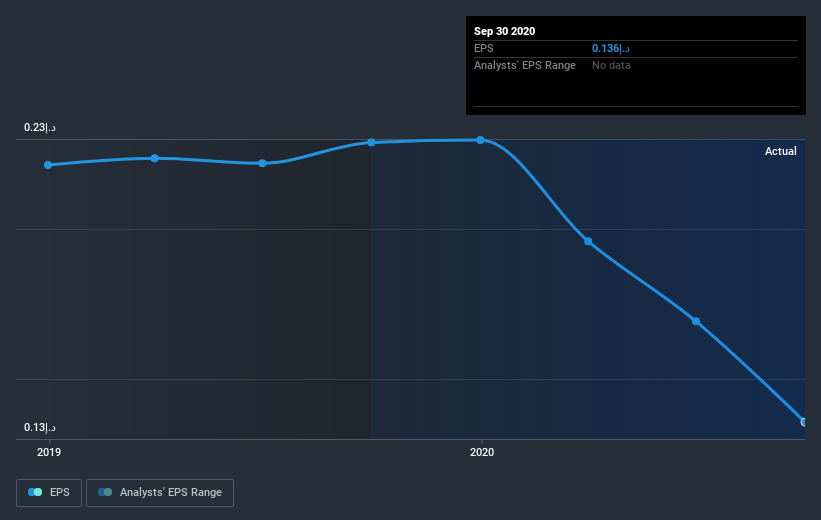- United Arab Emirates
- /
- Banks
- /
- ADX:NBQ
If You Had Bought National Bank of Umm Al-Qaiwain (PSC)'s (ADX:NBQ) Shares Five Years Ago You Would Be Down 41%
The main aim of stock picking is to find the market-beating stocks. But every investor is virtually certain to have both over-performing and under-performing stocks. So we wouldn't blame long term National Bank of Umm Al-Qaiwain (PSC) (ADX:NBQ) shareholders for doubting their decision to hold, with the stock down 41% over a half decade.
Check out our latest analysis for National Bank of Umm Al-Qaiwain (PSC)
To quote Buffett, 'Ships will sail around the world but the Flat Earth Society will flourish. There will continue to be wide discrepancies between price and value in the marketplace...' One imperfect but simple way to consider how the market perception of a company has shifted is to compare the change in the earnings per share (EPS) with the share price movement.
During the five years over which the share price declined, National Bank of Umm Al-Qaiwain (PSC)'s earnings per share (EPS) dropped by 13% each year. The share price decline of 10% per year isn't as bad as the EPS decline. The relatively muted share price reaction might be because the market expects the business to turn around.
The image below shows how EPS has tracked over time (if you click on the image you can see greater detail).

Dive deeper into National Bank of Umm Al-Qaiwain (PSC)'s key metrics by checking this interactive graph of National Bank of Umm Al-Qaiwain (PSC)'s earnings, revenue and cash flow.
What About Dividends?
It is important to consider the total shareholder return, as well as the share price return, for any given stock. Whereas the share price return only reflects the change in the share price, the TSR includes the value of dividends (assuming they were reinvested) and the benefit of any discounted capital raising or spin-off. Arguably, the TSR gives a more comprehensive picture of the return generated by a stock. As it happens, National Bank of Umm Al-Qaiwain (PSC)'s TSR for the last 5 years was -26%, which exceeds the share price return mentioned earlier. This is largely a result of its dividend payments!
A Different Perspective
National Bank of Umm Al-Qaiwain (PSC) provided a TSR of 6.6% over the last twelve months. But that was short of the market average. But at least that's still a gain! Over five years the TSR has been a reduction of 5% per year, over five years. So this might be a sign the business has turned its fortunes around. I find it very interesting to look at share price over the long term as a proxy for business performance. But to truly gain insight, we need to consider other information, too. Even so, be aware that National Bank of Umm Al-Qaiwain (PSC) is showing 2 warning signs in our investment analysis , and 1 of those is significant...
If you like to buy stocks alongside management, then you might just love this free list of companies. (Hint: insiders have been buying them).
Please note, the market returns quoted in this article reflect the market weighted average returns of stocks that currently trade on AE exchanges.
If you’re looking to trade National Bank of Umm Al-Qaiwain (PSC), open an account with the lowest-cost* platform trusted by professionals, Interactive Brokers. Their clients from over 200 countries and territories trade stocks, options, futures, forex, bonds and funds worldwide from a single integrated account. Promoted
Valuation is complex, but we're here to simplify it.
Discover if National Bank of Umm Al-Qaiwain (PSC) might be undervalued or overvalued with our detailed analysis, featuring fair value estimates, potential risks, dividends, insider trades, and its financial condition.
Access Free AnalysisThis article by Simply Wall St is general in nature. It does not constitute a recommendation to buy or sell any stock, and does not take account of your objectives, or your financial situation. We aim to bring you long-term focused analysis driven by fundamental data. Note that our analysis may not factor in the latest price-sensitive company announcements or qualitative material. Simply Wall St has no position in any stocks mentioned.
*Interactive Brokers Rated Lowest Cost Broker by StockBrokers.com Annual Online Review 2020
Have feedback on this article? Concerned about the content? Get in touch with us directly. Alternatively, email editorial-team (at) simplywallst.com.
About ADX:NBQ
National Bank of Umm Al-Qaiwain (PSC)
Engages in the provision of retail and corporate banking services in the United Arab Emirates.
Adequate balance sheet average dividend payer.
Market Insights
Community Narratives




